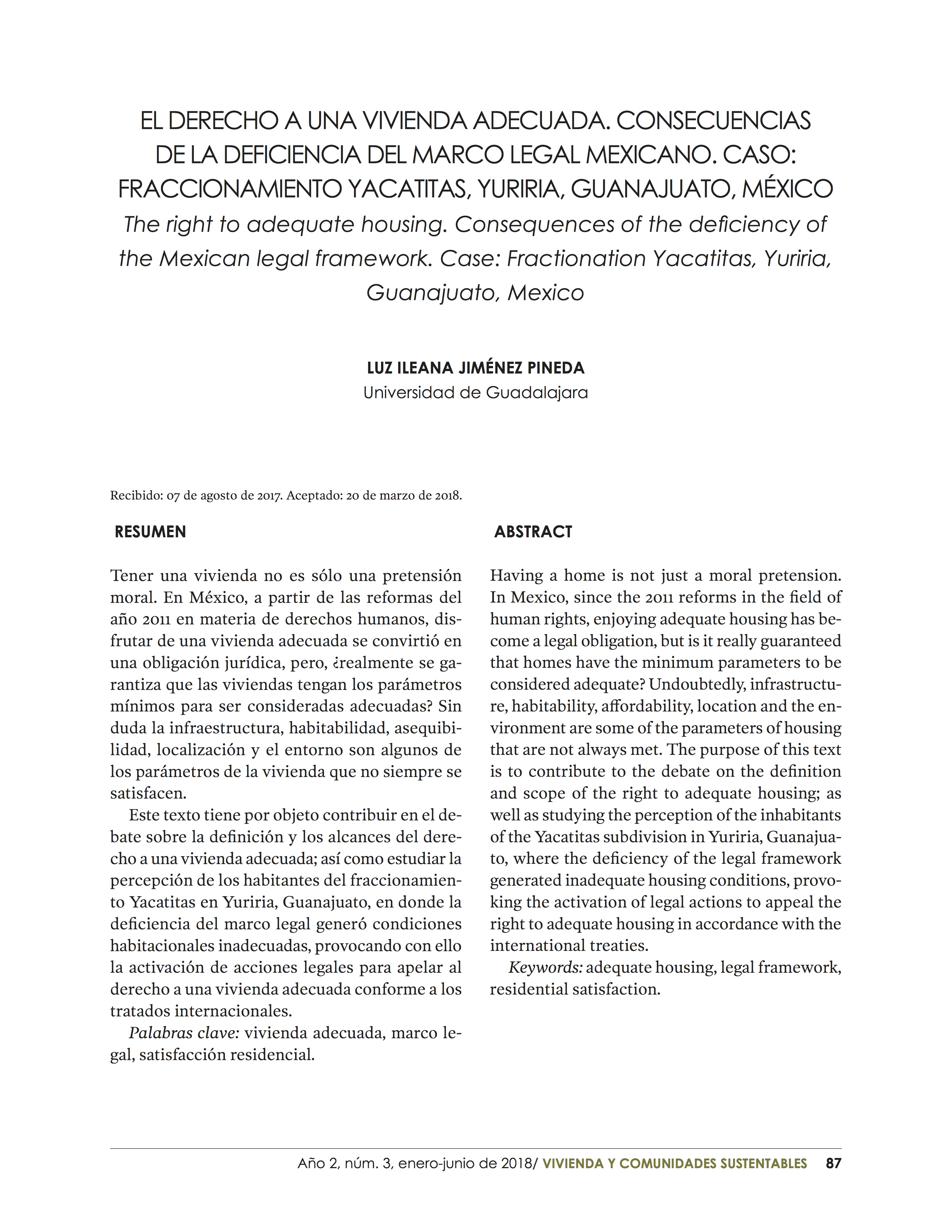El derecho a una vivienda adecuada. Consecuencias de la deficiencia del marco legal mexicano. Caso: fraccionamiento Yacatitas, Yuridia, Guanajuato, México
DOI:
https://doi.org/10.32870/rvcs.v0i3.20Palabras clave:
Vivienda adecuada, marco legal, satisfacción residencial, calidad de vida, vivienda socialResumen
Tener una vivienda no es so?lo una pretensio?n moral. En Me?xico, a partir de las reformas del an?o 2011 en materia de derechos humanos, dis- frutar de una vivienda adecuada se convirtio? en una obligacio?n juri?dica, pero, ¿realmente se garantiza que las viviendas tengan los para?metros mi?nimos para ser consideradas adecuadas? Sin duda la infraestructura, habitabilidad, asequibilidad, localizacio?n y el entorno son algunos de los para?metros de la vivienda que no siempre se satisfacen. Este texto tiene por objeto contribuir en el de- bate sobre la de nicio?n y los alcances del derecho a una vivienda adecuada; asi? como estudiar la percepcio?n de los habitantes del fraccionamien- to Yacatitas en Yuriria, Guanajuato, en donde la de ciencia del marco legal genero? condiciones habitacionales inadecuadas, provocando con ello la activacio?n de acciones legales para apelar al derecho a una vivienda adecuada conforme a los tratados internacionales.Métricas
Citas
Adriaanse, C. (2007). Measuring residential satis- faction: A residential environmental satisfac- tion scale (ress). Journal of Housing and the Built Environment, pp. 287-304.
Álvarez, L. (2015). La vivienda deshabitada: Objetivos sociales o nancieros. En: Pineda, P., Cuestiones sociales y políticas (pp. 337-342). Zapopan, Jalisco: Instituto en Investigaciones en Políticas Públicas y Gobierno.
Barreto, M. (2010). El concepto de “hábitat digno” como meta de una política integral de áreas ur- banas de citarias críticas, para la integración social desde los derechos humanos. Revista invi, pp. 161-187. Obtenido de INVI.
Díaz-Serrano, L. (2006). Housing satisfaction, homeownership and housing mobility: A panel data analysis for twelve eu countries. iza Dis- cussion Paper, vol. 10, núm. 5, pp. 661-683. Disponible en: <http://legacy.iza.org/en/webcontent/ publications/papers/viewAbstract?dp_id=2318>
Elsinga, M., y Hoekstra, J. (2005). Homeownership and housing satisfaction. Journal of Hou- sing and the Built Environment, 20(4): 401-424. Disponible en: <https://www.jstor.org/sta- ble/41107316?seq=1#page_scan_tab_contents>Felperin, M., y Torrens, M. C. (2005). El derecho a la vivienda adecuada como derecho humano. En: Díaz, L. (Coord.), Derechos humanos 2 (pp. 137-150). Santa Fe: Juris.
——. (2009). Derecho a la vivienda como derecho social: Implicaciones consitucionales. Dret públic, pp. 2-13.
Flores, A. (2012). La cuestión habitacional: Crisis nancieras, naturales, intitucionales y de de- rechos. En: Bolívar, T. y Erazo, J. (Coord.), Di- mensiones del hábitat popular latinoamericano (pp. 209-236). Quito: CLACSO.
Tan, T., y Khong, K. (2013). The link between ho- meownership motivation and housing satisfaction. International Journal of Economic and Management, 6(1): 1-19. Disponible en:
MATERIAL LEGAL
Amparo en revisión, 2441/2014 (Primera Sala de la SCJN, 25 de febrero de 2015).
Asamblea General de la Organización de las Nacio- nes Unidas. (1966). Decreto 2200A, 03 de enero de 1976. Pacto Internacional de Derechos Económicos, Sociales y Culturales.
Comité de Derechos Económicos, Sociales y Culturales, Sexto Periodo. (1991). Observaciones generales, núm. 4.
Gobierno de la República. (1917). Constitución Política de los Estados Unidos Mexicanos. Diario O cial de la Federacion, 15 de agosto de 2016.
Ley de Vivienda. (2006). Diario Oficial de la Fede- ración, 20 de octubre de 2015.
Ley General de Asentamientos Humanos, Ordenamiento Territorial y Desarrollo Urbano. (2016). Diario Oficial de la Federación, 28 de noviembre de 2016.
Tesis. (2015). Derecho fundamental a una vivienda digna y decorosa, 1a.ccv/2015 (10a). Primera Sala, junio de 2015.

Descargas
Publicado
Cómo citar
Número
Sección
Licencia
Derechos de autor 2018 Vivienda y Comunidades Sustentables

Esta obra está bajo una licencia internacional Creative Commons Atribución-NoComercial-SinDerivadas 4.0.
Los autores/as que publiquen en esta revista aceptan las siguientes condiciones:
De acuerdo con la legislación de derechos de autor, Vivienda y Comunidades Sustentables reconoce y respeta el derecho moral de los autores, así como la titularidad del derecho patrimonial, el cual será cedido a la Universidad de Guadalajara para su difusión en acceso abierto. Vivienda y Comunidades Sustentables no realiza cargos a los autores por enviar y procesar artículos para su publicación.
Los autores/as pueden realizar otros acuerdos contractuales independientes y adicionales para la distribución no exclusiva de la versión del artículo publicado en Vivienda y Comunidades Sustentables (por ejemplo incluirlo en un repositorio institucional o publicarlo en un libro) siempre que indiquen claramente que el trabajo se publicó por primera vez en Vivienda y Comunidades Sustentables.





